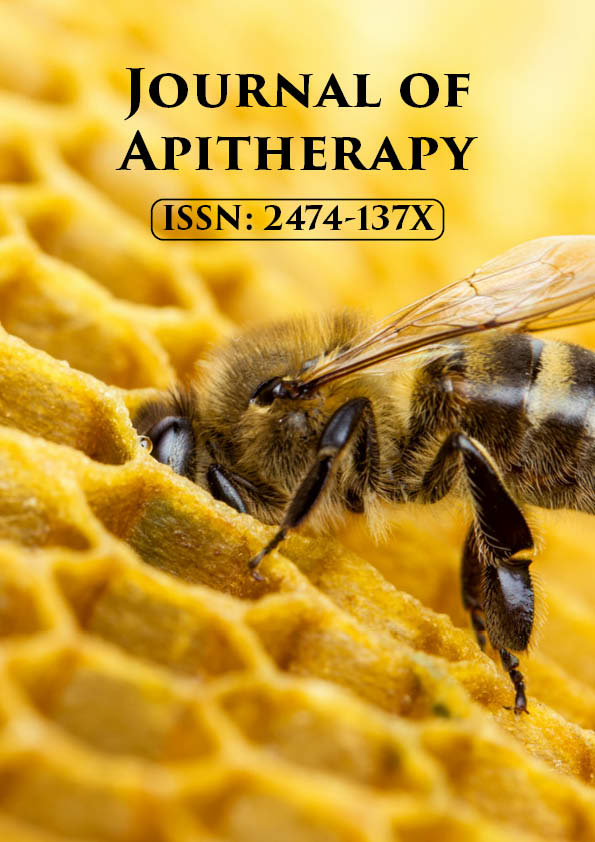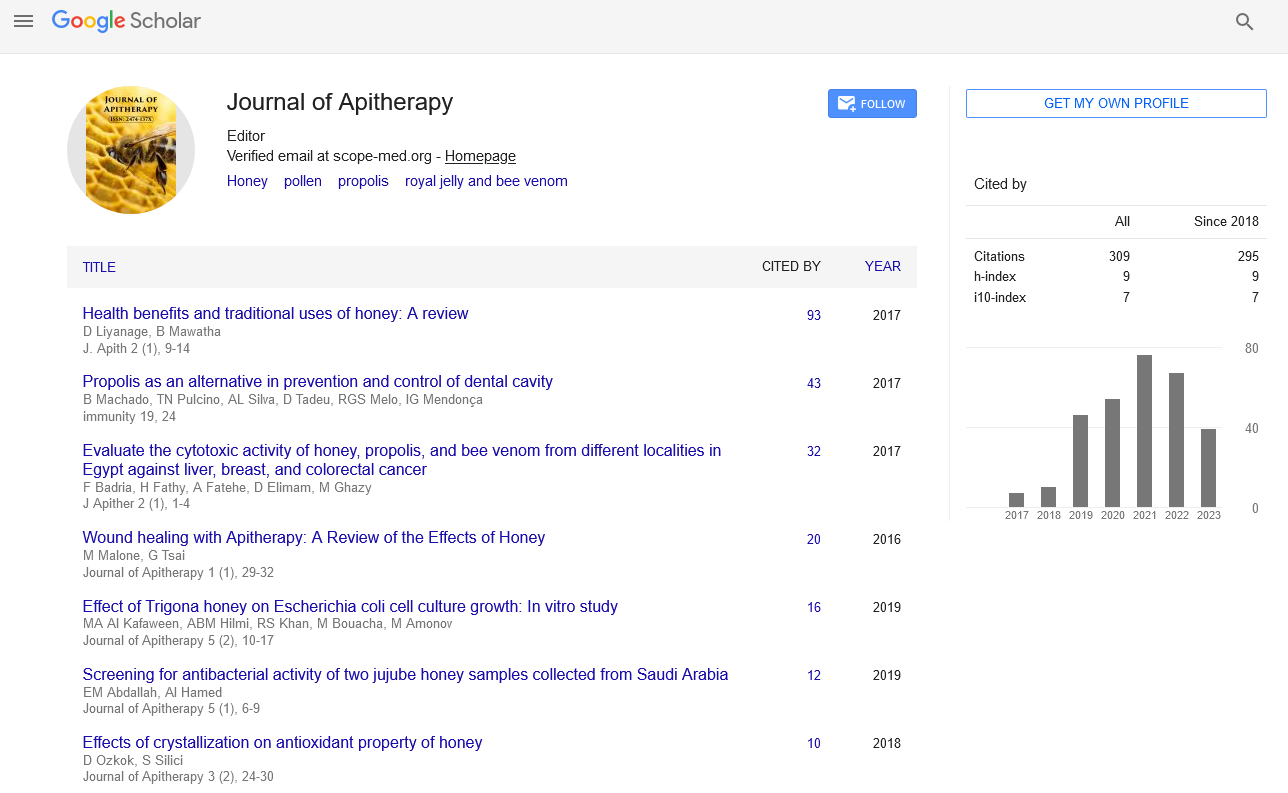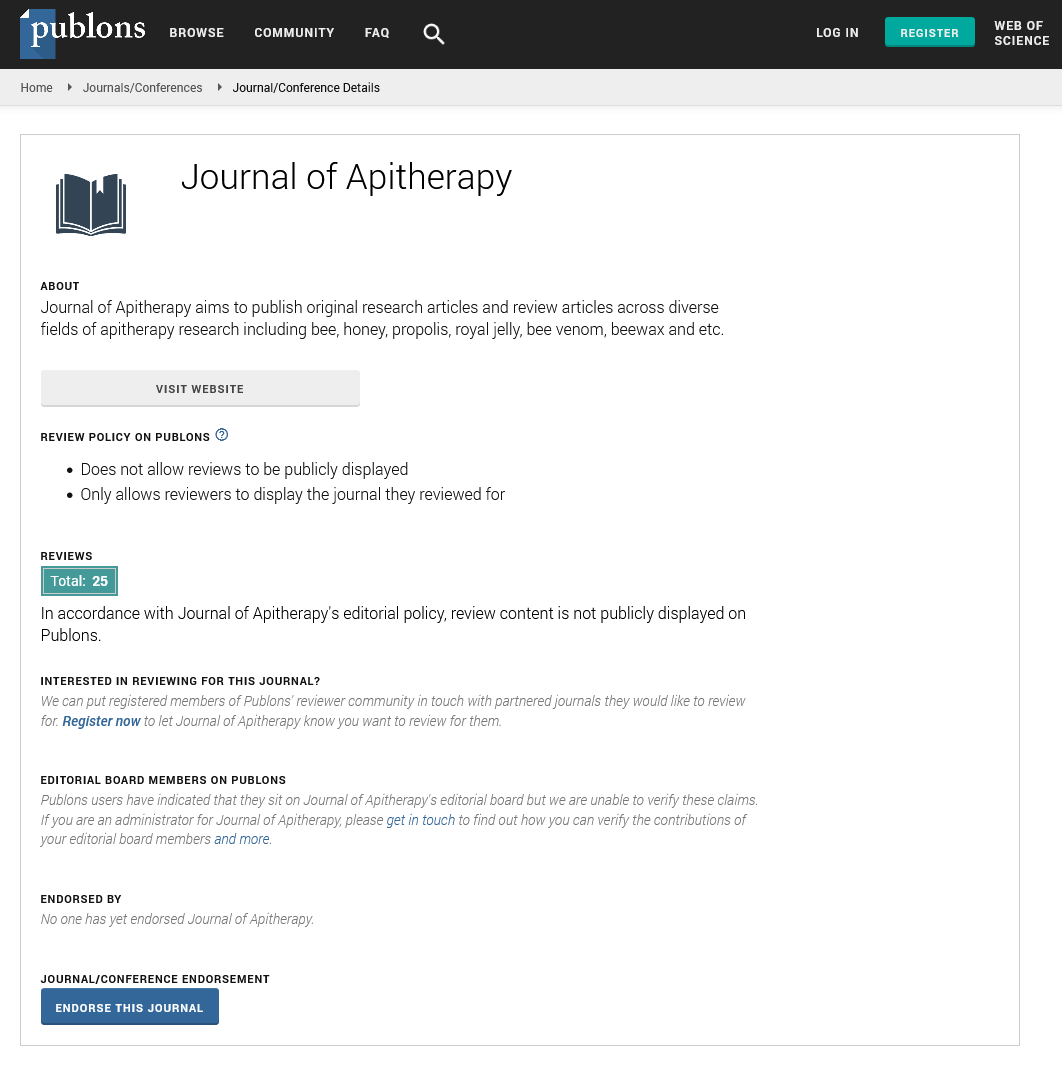Commentary - Journal of Apitherapy (2023)
Health Benefits of Bee Propolis: Natural Remedy for Inflammation, Infection, and More
John Levoni*John Levoni, Department of Apiculture, University of São Paulo, São Paulo, Brazil, Email: johnlevonii2@hotmail.com
Received: 02-Jan-2023, Manuscript No. Japitherapy-23-90201; Editor assigned: 04-Jan-2023, Pre QC No. Japitherapy-23-90201(PQ); Reviewed: 18-Jan-2023, QC No. Japitherapy-23-90201; Revised: 25-Jan-2023, Manuscript No. Japitherapy-23-90201(R); Published: 01-Feb-2023
Description
Bee propolis, also known as “bee glue,” is a natural resinous substance produced by bees from various plants and trees. Bees use propolis to seal cracks in their hives and protect them from intruders and pathogens. Propolis has been used for centuries for its various medicinal properties and health benefits. In this article, we will explore the health benefits of bee propolis and its potential uses.
Anti-inflammatory and Antibacterial Properties
Propolis has been shown to have powerful anti-inflammatory and antibacterial properties. Its antimicrobial activity is due to the presence of various compounds such as flavonoids, terpenoids, and phenolic acids [1]. These compounds help to inhibit the growth of harmful bacteria and fungi, making it an effective natural antibiotic. Additionally, propolis has been shown to reduce inflammation by inhibiting the production of inflammatory cytokines.
Boosts Immune System
Propolis can help boost the immune system by increasing the production of antibodies and stimulating the activity of immune cells. Studies have shown that propolis can enhance the function of macrophages, which are white blood cells that engulf and digest foreign particles and harmful microorganisms. This immune-boosting effect may be useful in preventing and treating various infections and diseases.
Terpenoids: Terpenoids are extremely fragrant substances that have potent antifungal properties that support antibacterial action. Its inclusion in natural extracts helps to increase energy levels, improve skin penetration, and decrease the expression of inflammatory mediators.
Promotes Oral Health
Propolis has been used for centuries as a natural remedy for oral health problems. Its antibacterial properties make it effective in treating and preventing dental caries and gum disease. Propolis has also been shown to reduce the formation of plaque and prevent the growth of harmful bacteria in the mouth. Additionally, propolis has been used to relieve the pain and inflammation associated with toothaches and other oral infections [2-4].
Potential Anti-cancer Effects
Studies have shown that propolis may have potential anti-cancer effects. Its antioxidant and anti-inflammatory properties may help to prevent the development and progression of cancer. Additionally, propolis has been shown to inhibit the growth of cancer cells and induce apoptosis (programmed cell death) in some types of cancer cells.
Wound Healing Properties
Propolis has been used for centuries to promote wound healing. Its antibacterial and anti-inflammatory properties help to prevent infection and reduce inflammation, which can speed up the healing process [5]. Propolis has also been shown to promote the growth of new skin cells and improve the formation of granulation tissue, which is essential for wound healing.
Relieves Allergies
Propolis has been shown to have antihistamine and anti- inflammatory properties, which can help to relieve allergy symptoms [6]. Studies have shown that propolis can reduce the production of histamine, a chemical that is responsible for allergy symptoms such as sneezing, itching, and runny nose. Additionally, propolis has been shown to reduce inflammation in the airways, which can help to relieve asthma symptoms.
In conclusion, bee propolis is a natural substance with various health benefits. It’s anti-inflammatory, antibacterial, immune-boosting, and wound healing properties make it a useful natural remedy for various health problems. Additionally, its potential anti-cancer effects and ability to relieve allergies make it a promising area of research. However, it is important to note that propolis may cause allergic reactions in some people and should be used with caution. As with any natural remedy, it is best to consult with a healthcare provider before using propolis for medicinal purposes.
References
- Frozza COD, Silvestrin CCG, Gambato G, Denize OM, Salvador M, Moura FFP, etal. Chemical characterization, antioxidant and cytotoxic activities of brazilian red propolis. Food Chem Toxicol 2013;52: 137-142.
[Crossref] [Google scholar] [Pubmed]
- Hegazi AG, Abd El HadyFK, Abd Allah FA. Chemical composition and antimicrobial activity of European propolis. Z Naturforsch C J Biosci 2000;55: 70-75.
[Crossref] [Google scholar] [Pubmed]
- Huang S, Zhang CP, Wang K, Li G, Hu FL. Recent advances in the chemical composition of propolis. Molecules 2014;19: 19610-19632.
[Crossref] [Google scholar] [Pubmed]
- Kumazawa S, Hamasaka T, Nakayama T. Antioxidant activity of propolis of various geographic origins. Food Chemistry 2004;84: 329-339.
- Lagouri V, Prasianaki D, Krysta F. Antioxidant properties and phenolic composition of Greek propolis extracts. International Journal of Food Properties 2013;17: 511-522.
- Simone-Finstrom M, Spivak M. Propolis and bee health: The natural history and significance of resin use by honey bees. Apidologie 2010;41: 295-311.
Copyright: © 2023 The Authors. This is an open access article under the terms of the Creative Commons Attribution NonCommercial ShareAlike 4.0 (https://creativecommons.org/licenses/by-nc-sa/4.0/). This is an open access article distributed under the terms of the Creative Commons Attribution License, which permits unrestricted use, distribution, and reproduction in any medium, provided the original work is properly cited.







